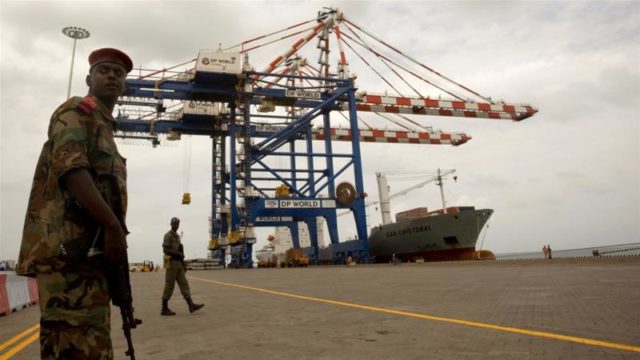
Briefs
Publication: Terrorism Monitor Volume: 16 Issue: 12
By:

Somalia: The Gulf Crisis Spills Into the Horn of Africa
Somalia is officially neutral in the Gulf split with Qatar, but it has become a political battleground for the dispute that, if allowed to fester, threatens to undermine Somalia’s battle against al-Shabaab.
The United Arab Emirates (UAE) has helped fund and train the Somali military since 2014, but deteriorating relations brought that to an end in April (The National, April 16). It follows the seizure by Somalia of $9.6 million from a UAE plane that landed at Mogadishu airport (Garowe Online, April 9; al-Jazeera, April 9). Abu Dhabi said the money was to pay the salaries of members of the Somali military, and complained its personnel on the flight had been held at gunpoint and assaulted by Somali security forces. (The National [UAE], April 10). The Somali government said it would need to investigate the intended destination of the cash.
In the days that followed, the Somali defense ministry proceeded to take over the UAE’s training facility in the capital, thanking the UAE for its efforts (Radio Dalsan, April 21). Earlier Abu Dhabi suspended operations at a UAE-run hospital in Mogadishu (Halbeeg, April 17). The UAE’s development of the Berbera port in Somaliland, and an agreement to train Somaliland security forces there, has also exacerbated tensions (al-Jazeera, March 27).
Qatar has been quick to step in, donating buses and cranes and backing Somalia’s President Mohamed Abdullahi Farmajo (Garowe Online, May 14; The Peninsula, April 18). This month, with Ramadan coming to an end, Qatar has promised more than $16 million in aid to Somalia (The Peninsula, June 8). The announcement is partially a slap in the face for Abu Dhabi since among the aid organizations committed to this donation is Qatar Charity, one of the entities blacklisted by Saudi Arabia and the UAE for alleged links to al-Qaeda.
While the UAE and Saudi Arabia see Farmajo’s turn to Qatar as ingratitude, the move is neither sudden nor surprising (Horn Diplomat, January 24). The president is less disinterested than Somalia’s official position suggests. Qatar donated to the president’s election campaign and his chief of staff, Fahad Yasin Dahir, is a former al-Jazeera journalist who has supposedly fostered the president’s relationship with Doha (All Africa, May 31, 2017).
In response, the UAE has backed Farmajo’s rivals, including regional administrations that have strained relations with Mogadishu. Undercutting the president, however, is a recipe for instability and a diversion of resources from the scourge of al-Shabaab. Security was upped in the capital this month, in the face of increasing attacks, while the regions also continue to face violence from the group, including an attack in which a U.S. special operations soldier was killed (Hiiraan Online, June 4; Halbeeg, June 9).
To effectively tackle al-Shabaab Mogadishu needs to reconcile with the provincial administrations and soothe its own fractured politics. The worry is that the UAE’s support for the regions and Qatar’s support for the center will make that increasingly difficult to achieve.
Iran: Tough on Domestic Terror Threats
Iran has sentenced eight people to death in connection with last year’s coordinated terrorist attacks in Tehran, but the Islamic Republic’s domestic counter-terrorism efforts are in contrast to its unwillingness to adopt legislative changes to tackle international terrorism financing.
On June 11, Iran’s supreme court confirmed death sentences for eight people linked to the attacks on the Iranian parliamentary building and the mausoleum of Ayatollah Khomeini, which unfolded this time last year leaving 17 people dead (Mehr, June 11; al-Manar, May 13; Times of Israel, May 13). The eight—a further 18 defendants are awaiting trial—supposedly have ties to Islamic State (IS), which claimed to be behind the attack. None have previous convictions, and all have Iranian citizenship. At least one is said to have trained with IS abroad before returning to Iran (FNA, May 13).
Separately, Iranian authorities recently trumpeted the disruption of terrorist cells in the west of the country, along the border with Iraq, that were reportedly planning attacks (FNA, June 8; Mehr, June 10). Officials did not identify these groups, but they were likely Sunni militants opposed to Tehran.
However, the vigor with which Tehran tackles domestic terrorism is not reflected elsewhere. This month, lawmakers delayed signing up to the recommendations of the Financial Action Task Force (FATF), the inter-governmental policymaking body that sets international standards for combating money laundering and terrorism financing (FNA, June 10).
Having been on the FATF blacklist since 2008, Iran appeared to find the political will to cooperate in 2016, at a time when Western nations hoped to demonstrate the potential benefits to Tehran of signing up to the Joint Comprehensive Plan of Action (JCPOA), the P5+1 agreement on Iran’s nuclear program.
Tehran has dragged its feet on the necessary changes to bring things in line with FATF recommendations and, with the United States now outside the JCPOA, there is even less incentive. The Iranian parliament will revisit the issue in two months’ time, giving it the opportunity to assess how negotiations go with Germany, France and the United Kingdom—which hope to show the JCPOA can still prove to be beneficial, even without U.S. assistance.
However, committing to FATF could (and arguably should) interfere with Iran’s financial backing for entities such as Hezbollah, and potentially even its own Islamic Revolutionary Guard Corps (IRGC). Indeed, even if Iran achieves the necessary level of technical compliance, those issues will persist, making it hard to see how FATF can ultimately square this particular circle. Nonetheless, the inter-governmental body, which sees itself as non-political, has remained optimistic about the situation and has so far refrained from imposing countermeasures while Iran mulls things over.




